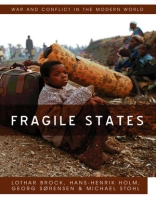Today a billion people, including about 340 million of the world’s extreme poor, are estimated to live in ‘fragile states’. This group of low-income countries are often trapped in cycles of conflict and poverty, which make them acutely vulnerable to a range of shocks and crises.
This engaging book defines and clarifies what we mean by fragile states, examining their characteristics in relation to ‘weak’ and ‘failed’ states in the global system, and explaining their development from pre-colonial times to the present day. It explores the connections between fragile statehood and violent conflict, and analyses the limitations of outside intervention from international society. The complexities surrounding ‘successes’ such as Costa Rica and Botswana – countries which ought to be fragile, but which are not – are analysed alongside the more precarious cases of the Democratic Republic of the Congo, Afghanistan and Haiti.
Absorbing and authoritative, Fragile States will be an invaluable resource for students and scholars of international relations, security studies and development.
Daftar Isi
Acknowledgements viii
Introduction: War and Conflict in Today’s World 1
1 Major Characteristics of Fragile States 14
2 The Formation of Fragile States 25
3 Fragile Statehood and Violent Conflict 46
4 Coping with State Fragility 97
5 Surprising Deviations: Fragility Escaped 138
Conclusion: The Fragile State Dilemma 159
References 173
Index 186
Tentang Penulis
Lothar Brock is research professor at the Peace Research
Institute, Frankfurt.
Hans-Henrik Holm is professor and head of department at
the Danish School of Media and Journalism.
Georg Sørensen is professor of political science at
Aarhus University.
Michael Stohl is professor of communication and political
science at the University of California, Santa Barbara.












